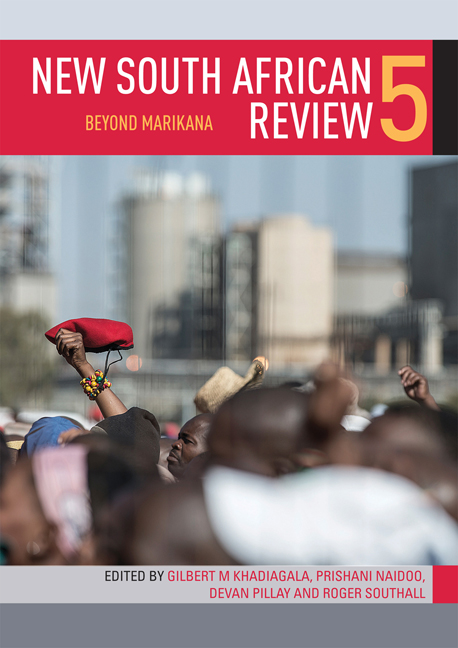Book contents
- Frontmatter
- Contents
- Preface
- Introduction: Political reconfigurations in the wake of Marikana
- PART 1 NEW POLITICAL DIRECTIONS?
- PART 2 ECONOMY, ECOLOGY AND LABOUR
- PART 3 STATE AND SOCIETY
- Introduction to Part 3
- Chapter 8 Constitutionalism: An ‘unqualified human good’?
- Chapter 9 People's Parliament? Do citizens influence South Africa's legislatures?
- Chapter 10 Corruption
- Chapter 11 Marikana and the politics of public order policing
- Chapter 12 ‘In December we are rich, in January we are poor’: Consumption, saving, stealing and insecurity in the kasi
- PART 4 SOUTH AFRICA IN THE INTERNATIONAL ARENA
- Contributors
- Index
Chapter 11 - Marikana and the politics of public order policing
from PART 3 - STATE AND SOCIETY
Published online by Cambridge University Press: 21 April 2018
- Frontmatter
- Contents
- Preface
- Introduction: Political reconfigurations in the wake of Marikana
- PART 1 NEW POLITICAL DIRECTIONS?
- PART 2 ECONOMY, ECOLOGY AND LABOUR
- PART 3 STATE AND SOCIETY
- Introduction to Part 3
- Chapter 8 Constitutionalism: An ‘unqualified human good’?
- Chapter 9 People's Parliament? Do citizens influence South Africa's legislatures?
- Chapter 10 Corruption
- Chapter 11 Marikana and the politics of public order policing
- Chapter 12 ‘In December we are rich, in January we are poor’: Consumption, saving, stealing and insecurity in the kasi
- PART 4 SOUTH AFRICA IN THE INTERNATIONAL ARENA
- Contributors
- Index
Summary
INTRODUCTION
On 16 August 2012, thirty-four protesting miners were killed by police gunfire at the Lonmin- owned Marikana mine. In the days and months that followed many in South Africa and elsewhere would reflect on how this evoked memories of incidents such as the 1961 Sharpeville massacre, the police killing of schoolchildren on 16 June 1976 and other brutal police responses to protest during the apartheid era. However, as Peter Alexander et al. (2012: 169) put it: ‘What is especially galling is that the atrocity occurred, not under an apartheid regime hostile to the black majority, but under a democratically elected government.’
The Marikana massacre has come to hold a central place in the analysis of policing and of broader political events since 2012. In the eyes of a number of policing researchers and commentators it is symbolic of the new political order's failure to overcome historical inequalities, and represents the breakdown of (arguably fragile and contingent) democratic police reform (Alexander et al. 2012: 169, n. 4; Marinovich 2014). But while the death toll was unprecedented in post-apartheid public order policing, Marikana cannot simply be understood as a return to the repressive tactics of the apartheid era, but should rather be seen as a signifier of changes that have taken place in public order policing and in the wider policing terrain.
This chapter focuses on the broad subject of public order policing in South Africa, and in particular the role of specialised public order policing units. It examines why, after having been the crowning achievement of the post-1994 democratic police reform project, public order policing fell into neglect and how, when the need for policing protest arose once again, public order police found themselves – in the words of one of South Africa's most senior and long-serving public order police officers – ‘the orphan’ of the South African Police Service (SAPS). The values, assumptions and strategies inculcated in those responsible for public order policing in the mid to late 1990s fell by the wayside, as did the comprehensive transformative training developed and implemented for this specialised unit. In its place, a combination of techniques and responses came into play, resembling but not mirroring those of the past.
- Type
- Chapter
- Information
- New South African Review 5Beyond Marikana, pp. 207 - 228Publisher: Wits University PressPrint publication year: 2015



